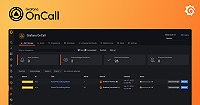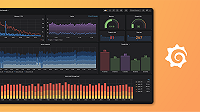Caution
As of 2025-03-11, Grafana OnCall OSS has entered maintenance mode, and will be archived on 2026-03-24. No further feature development will occur; however, we will still provide fixes for critical bugs and for valid CVEs with a CVSS score of 7.0 or higher. For more information, refer to our blog post.
Grafana OnCall users HTTP API
Get a user
Required permission: grafana-oncall-app.user-settings:read
This endpoint retrieves the user object.
curl "{{API_URL}}/api/v1/users/current/" \
--request GET \
--header "Authorization: meowmeowmeow" \
--header "Content-Type: application/json"The above command returns JSON structured in the following way:
{
"id": "U4DNY931HHJS5",
"grafana_id": 456,
"email": "public-api-demo-user-1@grafana.com",
"slack": [
{
"user_id": "UALEXSLACKDJPK",
"team_id": "TALEXSLACKDJPK"
}
],
"username": "alex",
"role": "admin",
"timezone": "UTC",
"teams": []
}HTTP request
GET {{API_URL}}/api/v1/users/<USER_ID>/
Use {{API_URL}}/api/v1/users/current to retrieve the current user.
List Users
Required permission: grafana-oncall-app.user-settings:read
curl "{{API_URL}}/api/v1/users/" \
--request GET \
--header "Authorization: meowmeowmeow" \
--header "Content-Type: application/json"The above command returns JSON structured in the following way:
{
"count": 1,
"next": null,
"previous": null,
"results": [
{
"id": "U4DNY931HHJS5",
"grafana_id": 456,
"email": "public-api-demo-user-1@grafana.com",
"slack": [
{
"user_id": "UALEXSLACKDJPK",
"team_id": "TALEXSLACKDJPK"
}
],
"username": "alex",
"role": "admin",
"timezone": "UTC",
"teams": ["TAAM1K1NNEHAG"]
}
],
"current_page_number": 1,
"page_size": 100,
"total_pages": 1
}Note: The response is paginated. You may need to make multiple requests to get all records.
The following available filter parameter should be provided as a GET argument:
username(Exact match)
HTTP request
GET {{API_URL}}/api/v1/users/




